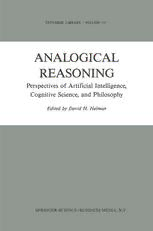Table Of ContentANALOGICAL REASONING
SYNTHESE LIBRARY
STUDIES IN EPISTEMOLOGY,
LOGIC, METHODOLOGY, AND PHILOSOPHY OF SCIENCE
Managing Editor:
JAAKKO HINTIKKA, Florida State University, Tallahassee
Editors:
DONALD DAVIDSON, University of California, Berkeley
GABRIEL NUCHELMANS, University of Leyden
WESLEY C. SALMON, University of Pittsburgh
VOLUME 197
ANALOGICAL
REASONING
Perspectives of Artificial Intelligence,
Cognitive Science, and Philosophy
Edited by
DAVID H. HELMAN
Case Western Reserve University
Springer-Science+Business Media, B.V.
Library of Congress Cataloging-in-Publication Data
Analogical reasoning / edited by David H. Helman.
p. em. -- <Synthese 1 ibrary ; v. 197)
Includes indexes.
1. Analogy. 2. Reasoning. I. Helman, David Henry. II. Series.
BD190.A57 1988
169--dc19 88-4732
CIP
All Rights Reserved
ISBN 978-90-481-8450-7 ISBN 978-94-015-7811-0 (eBook)
DOI 10.1007/978-94-015-7811-0
Sof'tcover reprint of the hardcover 1s t edition 1988
© 1988 by Springer Science+Business Media Dordrecht
Originally published by Kluwer Academic Publishers in 1988.
No part of the material protected by this copyright notice
may be reproduced or utilized in any form or by any means, electronic
or mechanical, including photocopying, recording or by any information
storage and retrieval system, without written permission from
the copyright owner
TABLE OF CONTENTS
PREFACE vii
PART I / CONCEPTUAL AND CATEGORICAL
THEORIES OF ANALOGICAL UNDERSTANDING
MARK TURNER / Categories and Analogies 3
MARK JOHNSON / Some Constraints on Embodied Analogi-
cal Understanding 25
P. K. SAHA / Metaphorical Style as Message 41
PART II / COMPUTATIONAL AND COGNITIVE
THEORIES OF ANALOGICAL REASONING
SMADAR KEDAR-CABELLI / Analogy - From a Unified
Perspective 65
PAUL THAGARD / Dimensions of Analogy 105
LAURA R. NOVICK / Analogical Transfer: Processes and
Individual Differences 125
RUSSELL GREINER / Abstraction-Based Analogical Inference 147
DEDRE GENTNER, BRIAN FALKENHAINER, and JANICE
SKORSTAD / Viewing Metaphor as Analogy 171
MARK H. BURSTEIN / Combining Analogies in Mental
Models 179
KEVIN D. ASHLEY / Arguing by Analogy in Law: A Case-
Based Model 205
PART III/LOGICAL AND PROBABILISTIC
THEORIES OF ANALOGICAL REASONING
TODD R. DAVIES / Determination, Uniformity, and Rele
vance: Normative Criteria for Generalization and Reasoning
by Analogy 227
v
vi TABLE OF CONTENTS
STUART RUSSELL/ Analogy by Similarity 251
ILKKA NIINILUOTO / Analogy and Similarity in Scientific
Reasoning 271
THEO A. F. KUIPERS / Inductive Analogy by Similarity and
Proximity 299
PART IV / ANALOGY AND INFORMATION
PROCESSING: PERSPECTIVES OF THE PHILOSOPHY
OF SCIENCE
MARY HESSE / Theories, Family Resemblances and Analogy 317
LINDLEY DARDEN and ROY RADA / Hypothesis Formation
Using Part-Whole Interrelations 341
DANIEL ROTHBART / Analogical Information Processing
within Scientific Metaphors 377
JOSEPH AGASSI / Analogies Hard and Soft 401
INDEX OF NAMES 421
INDEX OF SUBJECTS 425
PREFACE
In the last few years, there has been an enormous amount of activity in
the study of analogy and metaphor. This is partly because of an interest
of artificial intelligence researchers in simulating learning processes
using analogy. It also arises from critical examinations of standard
theories in the philosophy of language, with their inbuilt literal/meta
phoric distinction. This volume consists of recent previously unpub
lished work in this area, with a particular emphasis upon the role of
analogies in reasoning and, more generally, their role in thought and
language.
The papers are contributed by philosophers, computer scientists,
cognitive scientists and literary critics. Researchers in these fields whose
focus is the study of analogy and metaphor will find much of interest in
this volume. These essays can also serve as an introduction to some of
the major approaches taken in the investigation of analogy.
As noted, this volume brings together the work of researchers in
several different disciplines. The various approaches taken with respect
to the understanding of analogy tend to be rather different, however,
the articles suggest a common conclusion. Analogy and metaphor
pervade thought and language; their close investigation thus constitutes
a valuable contribution to our understanding of persons.
DAVID H. HELMAN
Case Western Reserve University
vii
PART I
CONCEPTUAL AND CATEGORICAL
THEORIES OF ANALOGICAL
UNDERSTANDING
MARK TURNER
CATEGORIES AND ANALOGIES
I want to pursue the following claims:
The way we categorize helps explain the way we recognize a
statement as an analogy.
Conversely, the way we recognize a statement as an analogy
illuminates the way we categorize.
Analogies exist because of the way we categorize.
Why do we categorize? If we responded to everything as being unique,
we would be swamped by the variety in our world. Perceiving differ
ence takes conceptual work, and, evolutionarily, there is no genetic
pay-off in perceiving difference except where it increases fitness. To
operate efficiently, we categorize. Our categories cut up our worlds into
clusters, so we can deal with clusters instead of elements. The fitness of
our cognition will depend upon the fitness of these conceptual cuts.
Consequently, a culture labors constantly and hard to optimize category
structures common to members of the culture, and implicit in their
language. 1
A culture's common conceptual categories and their relations, which
I will call its category structures, highlight certain connections between
concepts, and mask possible alternative connections. Analogies exist to
unmask, capture, or invent connections absent from or upstaged by
one's category structures. For us to recognize a statement as an analogy,
we must recognize that it is in some way putting pressure on our
category structures. This means that what we will consider to be an
analogy depends upon the particular details of our category structures.
So I am going to talk about how principles of recognizing a statement as
an analogy are influenced by and reflect principles of categorization.
To ask for an explanation of how we recognize a statement as an
analogy is to ask: how do we decide unconsciously and automatically
that it is a good strategy to try to take a certain equation between two
concepts as expressing analogical connection, as opposed to expressing
something else? The answer I will give claims that the approach we
select to understanding the equation depends upon the relative loca-
3
D. H. Helman (ed.), Analogical Reasoning, 3-24.
© 1988 by Kluwer Academic Publishers.

